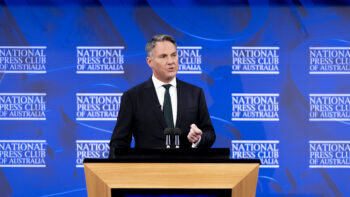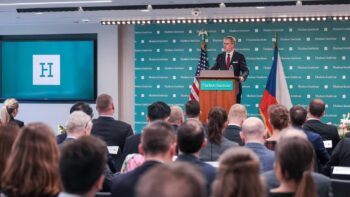
Global communication network concept. Elements of this image furnished by NASA. 3D rendering. (Getty images)
AMOS 2022 — Establishing accord among nations, even informally, about space traffic management (STM) in an ever more crowded environment is necessary, but not so easy to accomplish — especially now given rising military tensions in space, according to experts and officials attending the Advanced Maui Optical and Space Surveillance (AMOS) conference in Hawaii last week.
“I think it’s clear that STM is a global issue. I think it is clear that it can be effective only if it comes as a result of an international answer,” said Sebastian Moranta during a panel discussion Sept. 30.
Rodolphe Muñoz, a legal officer at the European Commission’s Directorate-General for Defense Industry and Space, agreed.
“Of course, if you talk about STM, and you look only to your own system, it’s useless,” he said.
To that end, European and US experts and government officials said, the European Union’s 27 nations and the United States have been exchanging information about their current and planned activities to a greater and greater extent — both on a bilateral and multilateral level.
“We’re engaging internationally,” stressed NOAA Office of Space Commerce Director Richard DalBello, in his AMOS keynote last Friday. “In particular, we’re collaborating with our colleagues at the European Space, Surveillance and Tracking Consortium.”
The consortium, designed to enhance civil and military space data sharing among European space operators, was created in 2015 by France, Germany, Italy, Spain and the United Kingdom. Poland, Portugal and Romania joined in 2018.
Pascal Faucher, chair of the EU Space Surveillance and Tracking; Defense and Security at the French Space Agency (CNES), said during Friday’s panel discussion that the consortium is growing in membership and is being supported budget-wise.
“We are a fully fledged component of the European Union space program. So, it means that we have a dedicated budget line, which is very comfortable,” he said. “And we are expanding right now towards a new partnership of 15 member states of the European Union.”
However, the experts said, even simple information exchange at a wider multilateral level can be a hard slog — with some nations reluctant to engage.
“[W]e have to probably be practical about these developments, and multilateralism is more challenged than ever,” said Moranta.
In particular, DalBello said, China has been unwilling to talk directly about its STM concerns or respond to US military concerns about the actions of its spacecraft — such as close approaches to US satellites by maneuvering Chinese ones, and Beijing’s testing of a space tug.
“I think our biggest international problem is non-participation [in dialogue],’ he said. “We have an issue, as everyone here knows, with China where they’re just simply not sharing information. And we cannot safely operate in space if a major space participant isn’t actively engaged and sharing information in a way that enhances safety for all.”
DalBello stressed that the US government has “reached out on many occasions and will continue to do so.”
China and the US have been entangled in a diplomatic squabble over Beijing’s allegations that SpaceX’s Starlink satellites have endangered China’s space station; meanwhile the US has expressed concerns that Beijing has for almost a decade rebuffed US information exchange overtures. And Beijing in February said it would be willing to talk bilaterally on STM-related issues, that doesn’t appear to have happened.
“This is a global effort,” DalBello said. “We have to be able to work with people even if we disagree with them on other issues.”






















